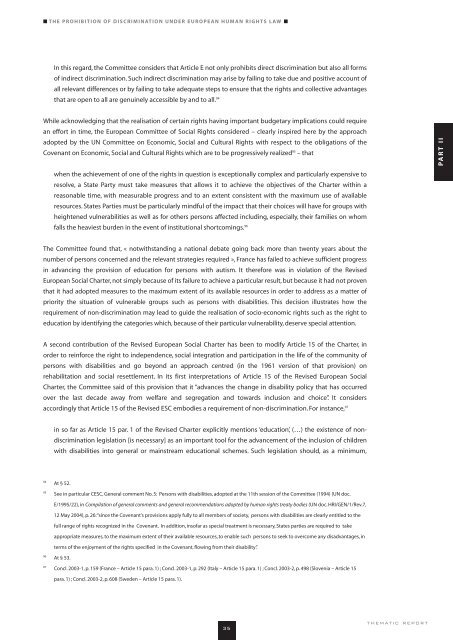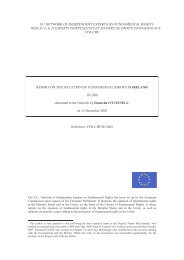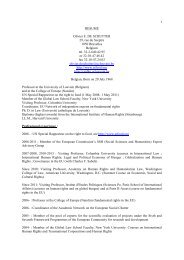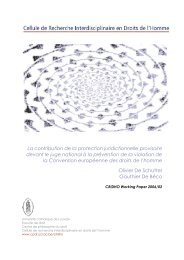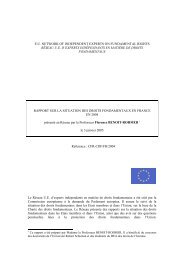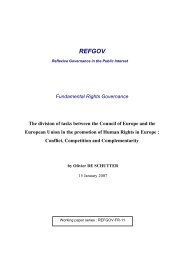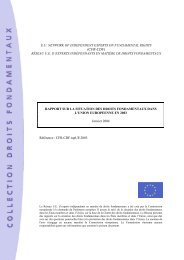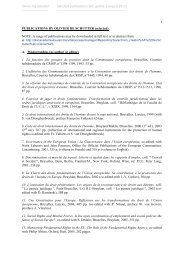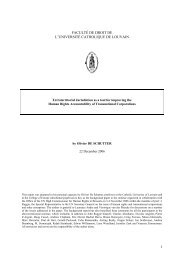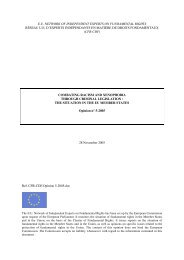The Prohibition of Discrimination under European Human ... - cridho
The Prohibition of Discrimination under European Human ... - cridho
The Prohibition of Discrimination under European Human ... - cridho
You also want an ePaper? Increase the reach of your titles
YUMPU automatically turns print PDFs into web optimized ePapers that Google loves.
■ THE PROHIBITION OF DISCRIMINATION UNDER EUROPEAN HUMAN RIGHTS LAW ■<br />
In this regard, the Committee considers that Article E not only prohibits direct discrimination but also all forms<br />
<strong>of</strong> indirect discrimination. Such indirect discrimination may arise by failing to take due and positive account <strong>of</strong><br />
all relevant differences or by failing to take adequate steps to ensure that the rights and collective advantages<br />
that are open to all are genuinely accessible by and to all. 94<br />
While acknowledging that the realisation <strong>of</strong> certain rights having important budgetary implications could require<br />
an effort in time, the <strong>European</strong> Committee <strong>of</strong> Social Rights considered – clearly inspired here by the approach<br />
adopted by the UN Committee on Economic, Social and Cultural Rights with respect to the obligations <strong>of</strong> the<br />
Covenant on Economic, Social and Cultural Rights which are to be progressively realized95 – that<br />
when the achievement <strong>of</strong> one <strong>of</strong> the rights in question is exceptionally complex and particularly expensive to<br />
resolve, a State Party must take measures that allows it to achieve the objectives <strong>of</strong> the Charter within a<br />
reasonable time, with measurable progress and to an extent consistent with the maximum use <strong>of</strong> available<br />
resources. States Parties must be particularly mindful <strong>of</strong> the impact that their choices will have for groups with<br />
heightened vulnerabilities as well as for others persons affected including, especially, their families on whom<br />
falls the heaviest burden in the event <strong>of</strong> institutional shortcomings. 96<br />
<strong>The</strong> Committee found that, « notwithstanding a national debate going back more than twenty years about the<br />
number <strong>of</strong> persons concerned and the relevant strategies required », France has failed to achieve sufficient progress<br />
in advancing the provision <strong>of</strong> education for persons with autism. It therefore was in violation <strong>of</strong> the Revised<br />
<strong>European</strong> Social Charter, not simply because <strong>of</strong> its failure to achieve a particular result, but because it had not proven<br />
that it had adopted measures to the maximum extent <strong>of</strong> its available resources in order to address as a matter <strong>of</strong><br />
priority the situation <strong>of</strong> vulnerable groups such as persons with disabilities. This decision illustrates how the<br />
requirement <strong>of</strong> non-discrimination may lead to guide the realisation <strong>of</strong> socio-economic rights such as the right to<br />
education by identifying the categories which, because <strong>of</strong> their particular vulnerability, deserve special attention.<br />
A second contribution <strong>of</strong> the Revised <strong>European</strong> Social Charter has been to modify Article 15 <strong>of</strong> the Charter, in<br />
order to reinforce the right to independence, social integration and participation in the life <strong>of</strong> the community <strong>of</strong><br />
persons with disabilities and go beyond an approach centred (in the 1961 version <strong>of</strong> that provision) on<br />
rehabilitation and social resettlement. In its first interpretations <strong>of</strong> Article 15 <strong>of</strong> the Revised <strong>European</strong> Social<br />
Charter, the Committee said <strong>of</strong> this provision that it “advances the change in disability policy that has occurred<br />
over the last decade away from welfare and segregation and towards inclusion and choice”. It considers<br />
accordingly that Article 15 <strong>of</strong> the Revised ESC embodies a requirement <strong>of</strong> non-discrimination. For instance, 97<br />
94<br />
95<br />
96<br />
97<br />
in so far as Article 15 par. 1 <strong>of</strong> the Revised Charter explicitly mentions ‘education’, (…) the existence <strong>of</strong> nondiscrimination<br />
legislation [is necessary] as an important tool for the advancement <strong>of</strong> the inclusion <strong>of</strong> children<br />
with disabilities into general or mainstream educational schemes. Such legislation should, as a minimum,<br />
At § 52.<br />
See in particular CESC, General comment No. 5: Persons with disabilities, adopted at the 11th session <strong>of</strong> the Committee (1994) (UN doc.<br />
E/1995/22), in Compilation <strong>of</strong> general comments and general recommendations adopted by human rights treaty bodies (UN doc. HRI/GEN/1/Rev.7,<br />
12 May 2004), p. 26:“since the Covenant’s provisions apply fully to all members <strong>of</strong> society, persons with disabilities are clearly entitled to the<br />
full range <strong>of</strong> rights recognized in the Covenant. In addition, ins<strong>of</strong>ar as special treatment is necessary, States parties are required to take<br />
appropriate measures, to the maximum extent <strong>of</strong> their available resources, to enable such persons to seek to overcome any disadvantages, in<br />
terms <strong>of</strong> the enjoyment <strong>of</strong> the rights specified in the Covenant, flowing from their disability”.<br />
At § 53.<br />
Concl. 2003-1, p. 159 (France – Article 15 para. 1) ; Concl. 2003-1, p. 292 (Italy – Article 15 para. 1) ; Concl. 2003-2, p. 498 (Slovenia – Article 15<br />
para. 1) ; Concl. 2003-2, p. 608 (Sweden – Article 15 para. 1).<br />
35<br />
thematic report<br />
PART II


